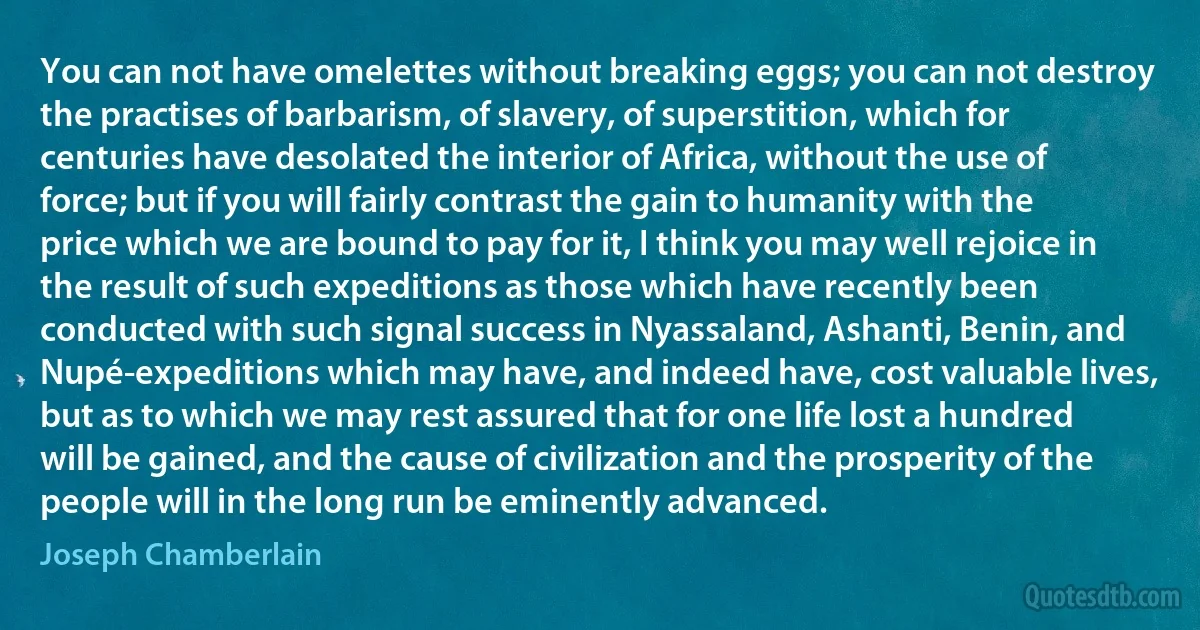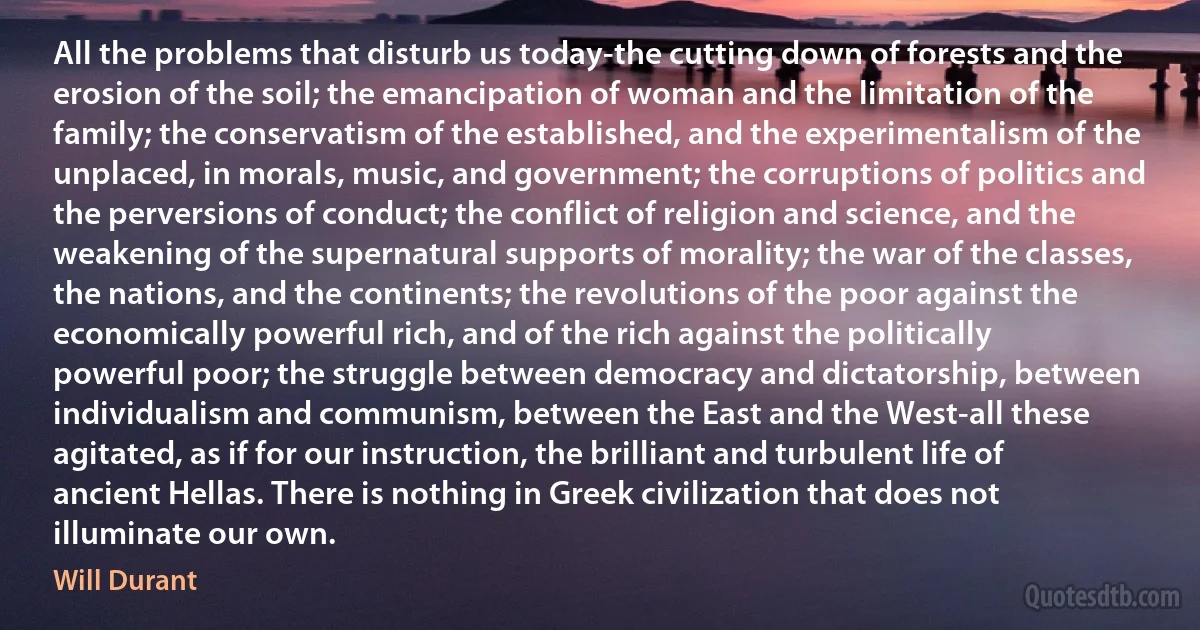Civilization Quotes - page 70
If that really is the last word of civilization, if we are to proceed on the assumption that the nearer the native or any human being comes to a pig the more desirable is his condition, of course I have nothing to say I must continue to believe that, at all events, the progress of the native in civilization will not be secured until he has been convinced of the necessity and the dignity of labour. Therefore, I think that anything we reasonably can do to induce the native to labour is a desirable thing, the existence of the tax is an inducement to him to work.

Joseph Chamberlain
I couldn't sit here and tell you that I'm sorry it happened.”
"Even with the death...?”
"Everybody dies. The obstetrician slaps you on the ass with one hand and hands you a postdated death certificate with the other. What's important is that our children have a better chance. It's always been about the children. Always. Women have never loved being kept from education and treated as second-class citizens. Men have never enjoyed having their balls shot off in wars. Men and women didn't fall into their roles accidentally, and each side doesn't hate the other. It happened because for a thousand generations, that was the best way we knew to build a civilization, to build a better future for our children. The industrial revolution doomed slavery-racial, sexual, social. Civilization is worth fighting for.

Larry Niven
Our position is such that we could not 'integrate' our economy into that of Europe in any manner that would prejudice the full discharge of these other responsibilities. At the same time, Britain regarded herself as bound up in western Europe, not only in economic, strategic and political interests, but in our culture and indeed in our participation in the heritage of Christian civilization.

Stafford Cripps
History does not repeat itself except with variations, and it is idle to look for exact parallels, but we can trace a resemblance between the conditions of his time and those of to-day. Once again the crust of civilization has worn thin, and beneath can be heard the muttering of primeval fires. Once again many accepted principles of government have been overthrown, and the world has become a laboratory where immature and feverish minds experiment with unknown forces. Once again problems cannot be comfortably limited, for science has brought the nations into an uneasy bondage to each other. In the actual business of administration there is no question of today which Augustus had not to face and answer.

John Buchan
He came to science fiction in 1952; some two or three years later, somebody told him he was writing parables, and Sheckley believed it. The stripped quality of his subsequent work, and its utter divorcement from fact and logic, are traceable to this unfortunate influence.
He has a unique touch with a wacky civilization, a clean, compact style, and a satirical wit that is dry without being bitter.

Robert Sheckley
One cannot see the modern world as it is unless one recognizes the overwhelming strength of patriotism, national loyalty. In certain circumstances it can break down, at certain levels of civilization it does not exist, but as a positive force there is nothing to set beside it. Christianity and international Socialism are as weak as straw in comparison with it. Hitler and Mussolini rose to power in their own countries very largely because they could grasp this fact and their opponents could not.

George Orwell
And Catholics, thousands of Catholics everywhere, have the consummate audacity to weep and complain because God does not hear their prayers for peace, when they have neglected not only His will, but the ordinary dictates of natural reason and prudence, and let their children grow up according to the standards of a civilization of hyenas.

Thomas Merton
The man who works, the man who does great deeds, in the end dies as surely as the veriest idler who cumbers the earth's surface; but he leaves behind him the great fact that he has done his work well. So it is with nations. While the nation that has dared to be great, that has had the will and the power to change the destiny of the ages, in the end must die, yet no less surely the nation that has played the part of the weakling must also die; and whereas the nation that has done nothing leaves nothing behind it, the nation that has done a great work really continues, though in changed form, to live forevermore. The Roman has passed away exactly as all the nations of antiquity which did not expand when he expanded have passed away; but their very memory has vanished, while he himself is still a living force throughout the wide world in our entire civilization of today, and will so continue through countless generations, through untold ages.

Theodore Roosevelt
In every wise struggle for human betterment one of the main objects, and often the only object, has been to achieve in large measure equality of opportunity. In the struggle for this great end, nations rise from barbarism to civilization, and through it people press forward from one stage of enlightenment to the next. One of the chief factors in progress is the destruction of special privilege. The essence of any struggle for healthy liberty has always been, and must always be, to take from some one man or class of men the right to enjoy power, or wealth, or position, or immunity, which has not been earned by service to his or their fellows. That is what you fought for in the Civil War, and that is what we strive for now.

Theodore Roosevelt
At the level of ordinary consciousness the individual man is the centre of everything, surrounded on all sides by what he isn't. At the level of practical sense, or civilization, there's a human circumference, a little cultivated world with a human shape, fenced off from the jungle and inside the sea and the sky. But in the imagination anything goes that can be imagined, and the limit of the imagination is a totally human world.

Northrop Frye
More is given to us than to any people at any time before; and, therefore, more is required of us. We have made, and still are making, enormous advances on material lines. It is necessary that we commensurately advance on moral lines. Civilization, as it progresses, requires a higher conscience, a keener sense of justice, a warmer brotherhood, a wider, loftier, truer public spirit. Falling these, civilization must pass into destruction. It cannot be maintained on the ethics of savagery. For civilization knits men more and more closely together, and constantly tends to subordinate the individual to the whole, and to make more and more important social conditions.

Henry George
Weird evening,” he said. "With this wind and all.”
Gladhand nodded. "Several hundred years ago it was considered a valid defense in a murder trial if you could prove the Santa Ana wind was blowing when the murder was committed. The opinion was that the dry, hot wind made everybody so irritable that any murder was almost automatically excusable. Or so I've heard, anyway.”
Thomas pondered it. "There might be something to that,” he said.
"No,” Gladhand said. "There isn't. Start sanctioning heat-of-anger crimes and you've lost the last hold on the set of conventions we call...society, civilization.

Tim Powers
Writing well was almost the same as thinking well, and thinking well was the next thing to acting well. All moral discipline, all moral perfection derived from the soul of literature, from the soul of human dignity, which was the moving spirit of both humanity and politics. Yes, they were all one, one and the same force, one and the same idea, and all of them could be comprehended in one single word... The word was - civilization!

Thomas Mann
Analysis as an instrument of enlightenment and civilization is good, in so far as it shatters absurd convictions, acts as a solvent upon natural prejudices, and undermines authority; good, in other words, in that it sets free, refines, humanizes, makes slaves ripe for freedom. But it is bad, very bad, in so far as it stands in the way of action, cannot shape the vital forces, maims life at its roots. Analysis can be a very unappetizing affair, as much so as death.

Thomas Mann
We are all afraid - for our confidence, for the future, for the world. That is the nature of the human imagination. Yet every man, every civilization, has gone forward because of its engagement with what it has set itself to do. The personal commitment of a man to his skill, the intellectual commitment and the emotional commitment working together as one, has made the Ascent of Man.

Jacob Bronowski
It's strange-you know, the Net is denounced as austere, the product of the engineering mentality, so forth and so on. It's the most feminine influence that Western civilization has ever allowed itself to fall under the spell of. The troubadors of the fourteenth century were as nothing compared to the boundary-dissolving, feminizing, permitting, nurturing nature of the Net. Maybe that's why there is an overwhelming male preference for it, in its early form, because that's where that was needed. But it is Sophia, it is wisdom, it is the penetrating archetypal female logos of the world-soul, leading us away from what was very sharp-edged and uncomfortable and repressive to our creativity and our sexuality and our relationships to each other and to the Earth.

Terence McKenna
Max Lerner, an educator, journalist and student of American civilization who was for many years a syndicated columnist for The New York Post, died yesterday... He was 89 ... Mr. Lerner was one of the more conspicuous of the post-World War II nonfiction writers, a humanist whose unabashed liberal conscience led him to the political barricades for more than three decades. Many of his concerns now seem prescient. In 1959, for example, in a speech at Douglass College in New Brunswick, N.J., Mr. Lerner called for the formation of an antiwar elite, making it clear that he was worried about what he saw as growing mediocrity among American students.

Max Lerner
Georgia is the country of unique culture. We are not only old Europeans, we are the very first Europeans, and therefore Georgia holds special place in European civilization. Georgia should serve as a paragon for democracy where all citizens are equal before the law, where every citizen will have an equal opportunity for the pursuit of success and realization of his or her possibilities. Georgia should become and will become a homeland for independent, educated and proud people.

Mikheil Saakashvili



